

WHAT IS VISHAKHA/WOMEN CELL
Panchakot Mahavidyalaya is a coeducational institution providing equal opportunities to all. Men and women work together in a congenial atmosphere, however if there are any complaints involving physical contacts or advances, demand for sexual favours, sexually tainted remarks, and any unwelcome physical, verbal or nonverbal expressions of a sexual nature; it is addressed and appropriate action is taken. This cell aims at sensitizing the students and staff to work diligently to prevent sexual harassment in the college. Complaints of sexual harassment shall be lodged with the Committee and appropriate disciplinary action is initiated by the members in accordance to the rules and regulations of the college.
WHAT IS INTERNAL COMPLINTS COMMITTEE (ICC)?
In pursuance of UGC (Prevention, Prohibition and Redressal of Sexual Harassment of Women Employees and Students in Higher Education Institutions) Regulations, 2015 read with Sexual Harassment of Women at Workplace (Prevention, Prohibition and Redressal) Act, 2013, the Internal Complaints Committee (ICC) of the College is constituted as under to deal with complaints relating to Sexual harassment at the work place.
WHY ICC?
FUNCTIONS OF ICC?
OBJECTIVES OF ICC?
Definition of Sexual Harassment:
“Sexual harassment” includes any unwelcome sexually inclined behaviour, whether directly or indirectly, such as:
a) Physical contact and advances
b) A demand or request for sexual favours
c) Making sexually coloured remarks (including jokes)
d) Showing pornography (books, photographs, paintings, films, pamphlets, packages, etc. containing ‘indecent representation of women’)
e) Any other unwelcome physical, verbal or non-verbal conduct of sexual nature.
Under the Act, the following also count as sexual harassment:
a) Implied or explicit promise of preferential treatment in her employment.
b) Implied or explicit threat of detrimental treatment in her employment
c) Implied or explicit threat about her present or future employment status
d) Interference with her work or creating an intimidating or offensive work environment for her
e) Humiliating treatment likely to affect her health or safety.
What are the possible actions that can be taken against the accused if found guilty?
Depending upon the severity of the case, punitive action may take any of the following forms
• Warning
• Written apology
• Bond of good behaviour
• Adverse remark in the Confidential Report
• Stopping of increments/promotion
• Suspension
• Dismissal
• Any other relevant actions
FUNCTIONNING
The ICC organizes training programmes and workshops for teaching and non-teaching faculty and students on measures for ensuring the safety of women and programmes for gender sensitization on the campus. This is done in association with the Women’s Cell though the latter remains autonomous of the functioning of the ICC. Committing itself to a zero tolerance policy towards sexual harassment, the ICC makes all sections of the institutional community aware of the information on the mechanism for redressal of complaints pertaining to sexual harassment. The ICC is committed to moving proactively to curb all forms of harassment of employees and students whether it is from those within the campus or from elements outside of the geographical limits of the college. The ICC is granted responsible freedom to bring those guilty of sexual harassment against employees and students to initiate all proceedings as required by law.
MEMBERS OF VISHAKHA/WOMEN CELL
| Sl. | Name | Designation | Capacity |
| 1 | Dr. SAPTARSHI CHAKRABORTY | Principal | President |
| 2 | Prof. RUPA MANDAL | Assistant Prof. | Convenor |
| 3 | Prof. SANTOSH BIAWAS | Assistant Prof. | Member |
| 4 | Prof. MUMMUN CHATTEERJEE | SACT | Member |
| 5 | Prof. KAKALI LAYEK | SACT | Member |
| 6 | Smt. ARATI THAKUR | Lady Attendant | Member |
The Authority of Panchakot Mahavidyalaya has appointed the following officer to deal with the appeal under VISHAKHA CELL.
| Sl. | Name | Role | Mobile | Address | |
| 1 | Prof.RUPA MANDAL | Convenor | 9830939410 | rupa.mandal1085@gmail.com | Dept. of Pol.Sc., Panchakot Mahavidyalaya |
ANY APPLICATION IN THIS RESPECT MUST BE SENT TO THE CONVENOR
| Sl. | Name | Designation | Capacity |
| 1 | Dr. SAPTARSHI CHAKRABORTY | Principal | President |
| 2 | Prof. RUPA MANDAL | Assistant Prof. | Convenor |
| 3 | Prof. SANTOSH BIAWAS | Assistant Prof. | Member |
| 4 | Prof. MUMMUN CHATTEERJEE | SACT | Member |
| 5 | Prof. KAKALI LAYEK | SACT | Member |
| 6 | Prof. TRISHNA ROY | Lawer | Ex. Member |
| 7 | Smt. ARATI THAKUR | Lady Attendant | Member |
| 8 | Sri. ANIRBAN SEN | NGO | Member |
| 9 | Miss Indushree Mondal | Student | Member |
| 10 | Miss Papiya Gorai | Student | Member |
| 11 | Miss Rumpa Mondal | Student | Member |
Minutes and Action Taken Reports
ACTION TAKEN REPORT OF THIS CELL
ANNUAL GENDER SENSITIZATION ACTION PLAN
SPECIFIC FACILITIES PROVIDED TO WOMEN
Fully protected campus: The college campus is completely protected with boundary walls and gates are checked by security personals 24x7.
CCTV surveillance: The College has 32 CCTV cameras operational 24x7.
ID card: ID Cards are issued by the college at the time of admission. Wearing them has been made mandatory andno one can enter the campus without this card.
Internal Complaints Committee (ICC): The College has constituted an ICC to ensure a harassment free campus that is committed to take proactive measures if such case arises in the college campus.
Women Cell & Grievance Redress Cell: These cells address various grievances of students and ensure discipline in college campus. There are both online and offline complaint lodging mechanismsand follow up actions are taken quickly.
Anti-Ragging Committee: There is an anti ragging committee in the college which ensures zero ragging in the campus and the committee includes faculties, guardian members, office staff member, representatives from student union as members.
Counseling: The Students Welfare Committeeprovides counseling to students to get rid of their personal stresses and strains. Teachers, as mentors, provides required counseling on demand. Non-teaching staff support the students in official matters such as admission procedure, fee payment, certificates, etc.
Common Rooms:The institution has common rooms separately for male and female. Separate toilets for male and female are present in adequate numbers.
Lady Attendant: A Lady Attendant is provided in the Girl's Common Room to look at all required needs of female students.
Sanitary pad Vending Machine: A Sanitary pad Vending Machine is provided in the Girl's Common Room.
Day Care Centre: The College has a well-equipped Day Care Centre to facilitate the Lady Teachers and students with children.
Lady Teachers’ Staff Room: The College has a well-equipped staffroom exclusively for lady teachers.
Scholarship: Amongst others, this college efficiently facilitates KANYASHREE scholarship meant only for girls. Our college has been awarded for distinctive achievement in this regard.
Self-Defense Training: The College provides a self-defense training for girls free of cost.
Other Facilities: The College has facilities like First Aid Box, Medical Room etc. that are optimally used by the lady teachers and female students.
| Women's Cell: | EVENTS | ||||||||
| Sl. | Date | Topic | Resource Person | Venue | Time | Detailed Report | Attended by | ||
| Teachers | Students | Others | |||||||
| 1 | 07.11.2014 | Debate on Dowry System | Prof. Jaya Biswas | Seminar Hall | 12:00 noon | 6 | 50 | NIL | |
| 2 | 13.11.2014 | Seminar on Rajniti o Nari itihasher Prekshite | Prof. Jaya Biswas | Seminar Hall | 12:00 noon | 4 | 66 | NIL | |
| 3 | 05.02.2015 | Extempore Lecture on Position of Women | Prof. Jaya Biswas | Seminar Hall | 12:00 noon | 3 | 52 | NIL | |
| 4 | 07.04.2015 | Position of Women from historical Perspective | Prof. Jaya Biswas | Seminar Hall | 12:00 noon | 11 | 74 | NIL | |
| 5 | 04.01.2017 | Existance of Discriminat ion between Men, women and 3rd sex | Prof. Jaya Biswas | Seminar Hall | 12:00 noon | 12 | 107 | NIL | |
| 6 | 08.05.2018 | Observation of Woemns' Day | Prof. Jaya Biswas | Seminar Hall | 12:00 noon | 7 | 156 | NIL | |
| 7 | 08.05.2019 | Observation of Woemns' Day | Prof. Jaya Biswas | Seminar Hall | 12:00 noon | 5 | 113 | NIL | |
| 8 | 28.04.2022 | Self Defence | Prof. Jaya Biswas | College Hall | 12:00 noon | 2 | 32 | NIL | |
| 9 | 08.05.2022 | Observation of Woemns' Day | Prof. Jaya Biswas | Seminar Hall | 12:30 pm | 6 | 103 | NIL | |
| 10 | 15.02.2023 | নারী সচেতনতা ও নারীর অধিকার | Dr. Barun Mandal | Seminar Hall | 12:30 pm | 6 | 87 | NIL | |
| 11 | 28.02.2023 | বিতর্ক প্রতিযোগীতা | Prof. Jaya Biswas | Seminar Hall | 01:30 pm | 2 | 44 | NIL | |
| 12 | 28.02.2023 | Poster Presentation | Prof. Jaya Biswas | Room No. 106 | 11:30 am | 3 | 21 | NIL | |
| 13 | 08.05.2023 | Observation of Woemns' Day | Prof. Jaya Biswas | Seminar Hall | 12:30 pm | 4 | 78 | NIL | |
| 14 | 11.10.2023 | Seminar on International Girl Child day | Prof. Jaya Biswas | Seminar Hall | 12:30 PM | 8 | 88 | NIL | |
| 15 | 13.10.2023 | Seminar on International Day for Rural Women | Prof. Jaya Biswas | Seminar Hall | 12:30 PM | 7 | 76 | NIL | |
| 16 | 25.11.2023 | Rally on International Day for Violence against Women | Prof. Jaya Biswas | Locality | 10:30 AM | 5 | 48 | NIL | |
| 17 | |||||||||
Programme on 11-10-2023
International Day of the Girl Child is an international observance day declared by the United Nations; it is also called the Day of Girls and the International Day of the Girl. October 11, 2012, was the first Day of the Girl Child. Organized by UNICEF and Plan International, the 2023 event aims to unite adolescent girls with advocates for their rights, including UN leaders, NGOs, businesses, and governments. The Indian government has not officially announced a theme for National Girl Child Day 2023. However, it is said that the celebration this year will be around the slogan, "Digital Generation, Our Generation, Our Time is Now—Our Rights, Our Future." The International Day of the Girl (IDG) – observed annually on 11 October – is a global platform to advocate for the full spectrum of girls' rights.
“A girl’s life should begin the way every life should: as an open book in which she writes her own story,” UNFPA Executive Director Dr. Natalia Kanem has said. “Yet from the moment a girl takes her first breath, she is already at a disadvantage simply because she was born a girl.”
Indeed, the numbers tell an alarming story. More than 640 million women alive today were married in childhood. In the developing world, nearly 1 in 3 women begins bearing children in adolescence. Twelve million adolescents give birth each year. Some 5.7 million adolescent pregnancies end in abortions, mostly in unsafe conditions.
But there is another story as well. Six hundred million adolescent girls globally represent infinite possibilities for leadership and change. Adolescent girls are driving forces in creating more just and sustainable societies in the future we want. Supporting their leadership and advocacy on issues from menstrual health to discriminatory gender norms upholds their rights, improves their well-being and increases their ability to contribute to change.
Ensuring access to comprehensive sexuality education and sexual and reproductive health services for adolescent girls will have a triple dividend – with benefits for girls now, as well as for their adult life and for the next generation of children. Increased and targeted investments will help guarantee the well-being of adolescent girls and their rights to education, health, equal opportunities and protection from harmful practices, such as female genital mutilation and child marriage.
Child marriage is the toxic product of economic inequality and gender inequality. Many impoverished parents believe that marriage will secure their daughters’ future. Some parents see their daughters as burdens or commodities, a perception exacerbated in times of crisis. In places where the bride’s family pays a dowry to the groom’s family, younger brides typically command smaller dowries, creating an incentive for parents to marry their daughters off early. In places where the groom’s family pays a bride price, parents in difficult circumstances may marry off their daughters as a source of income.
A girl should not be sacrificed for her family’s economic salvation. Let a girl be a girl. And let a woman’s wedding day be unforgettable for the right reasons, with tears shed for joy to celebrate beginnings, not for sorrow to mourn endings. Do we stand steadfast in our commitment to see that no girl is married before she freely decides she is willing and ready? We do.
Wedding websites are created by couples to inform wedding guests of details of the event, as well as the personal history of the couple’s life together. Such sites are intended to be celebratory. We created one for an 8-year-old child married off to a 31-year-old groom in Yemen. By subverting the idea of such a site with the horror of a real child marriage, we call attention to the plight of many girls around the world who have little to no bodily autonomy, a violation of their rights.
To be sure, adolescent girls face many intersecting forms of discrimination and exclusion related to age, gender, ethnicity, language, HIV status, marital or immigration status, disabilities and poverty. Gender-based violence affects almost 1 in 4 adolescents girls aged 15 to 19 who have ever been married or had a partner. Among adolescent girls with access to the Internet, 58 per cent have been harassed or abused online. A recent study in the United States found that 57 per cent of adolescent girls felt persistently sad or hopeless in 2021, double the rate among boys and the highest level in the past decade.
Girls have hopes to fulfill, dreams to achieve. As we mark the International Day of the Girl Child this year, we must step up investments and actions to make their dreams a reality. “Every single one of us can commit to being their allies and champions,” Dr. Kanem has said. “Instead of sidelining a girl, shine a spotlight on her. Instead of silencing her, hand her a microphone. Hear what she has to say. Give her the chance to chart her destiny and be a force for positive change.”
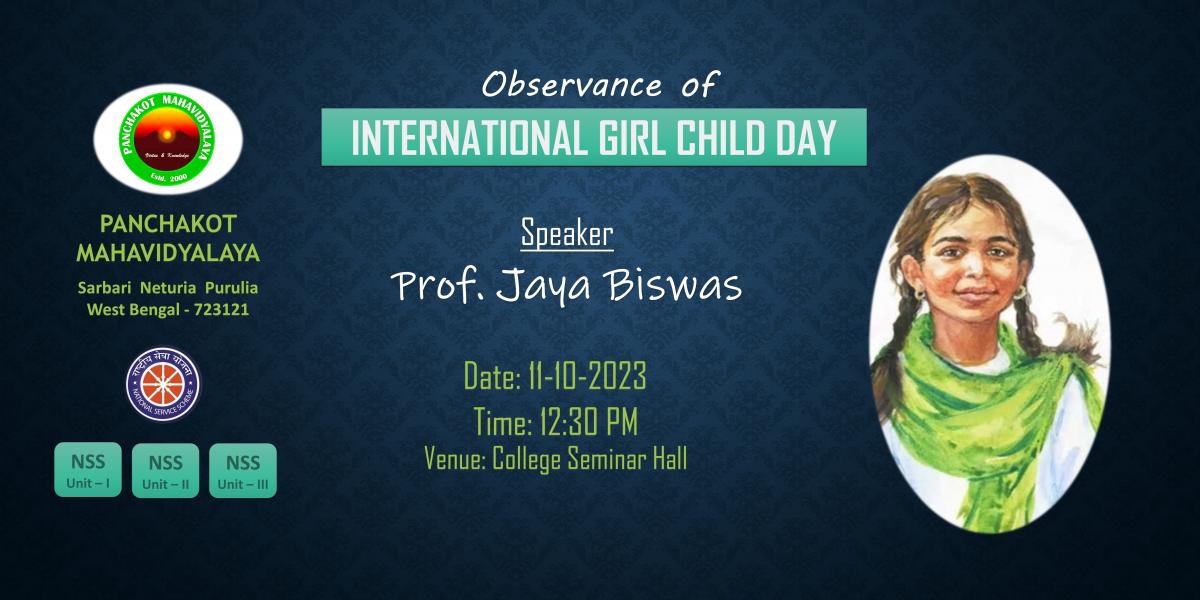
Programme on 13-10-2023
The theme for the International Day of Rural Women (15 October), “Rural Women Cultivating Good Food for All”, highlights the essential role that rural women and girls play in the food systems of the world.From production of crops to processing, preparing and distributing foods, women’s labour – paid and unpaid – feeds their families, communities and the world. Yet, they do not wield equal power with men, and as a result, they earn less income and experience higher food insecurity. Despite our planet’s capacity to provide sufficient and good food for all, hunger, malnourishment, and food insecurity are rising in many parts of the world. The COVID-19 pandemic, along with climate crises, have made matters worse: some 2.37 billion people did not have enough to eat in 2020 –that’s 20 per cent more than the year before. UN Women’s latest report, Beyond COVID-19: A feminist plan for sustainability and social justice, calls for rebuilding the broken global food system from the bottom-up by supporting rural women’s livelihoods to produce and distribute diverse and healthy food crops. With less than 10 years to achieve the Sustainable Development Goals, including Zero Hunger (Goal 2) and Gender Equality (Goal 5), UN Women is working to support rural women and girls around the world, to build their resilience, skills and leadership. This International Day of Rural Women offers us a renewed opportunity to commit to a different way of organizing our world, to build on the vision of the Feminist Plan and on the outcomes and multistakeholder commitments of the recent United Nations Food System Summit, so that rural women benefit equally from their productivity, with good food enjoyed by all. The first International Day of Rural Women was observed on 15 October 2008. This new international day, established by the General Assembly in its resolution 62/136 of 18 December 2007, recognizes “the critical role and contribution of rural women, including indigenous women, in enhancing agricultural and rural development, improving food security and eradicating rural poverty.” For that reason, the resolution urges the Member States, in collaboration with the organizations of the United Nations and civil society to implement measures that could improve rural women's lives, including the ones in indigenous communities. Governments and society need to pay attention to their needs and invest in them, pursuing the political and socio-economic empowerment of rural women and supporting their full and equal participation in decision-making at all levels, take them into account in their policies, developing specific assistance programs, and advisory services to promote economic skills of rural women in banking, modern trading and financial procedures and providing microcredit and other financial and business services, or designing laws to ensure that rural women are accorded full and equal rights to own land and other property.
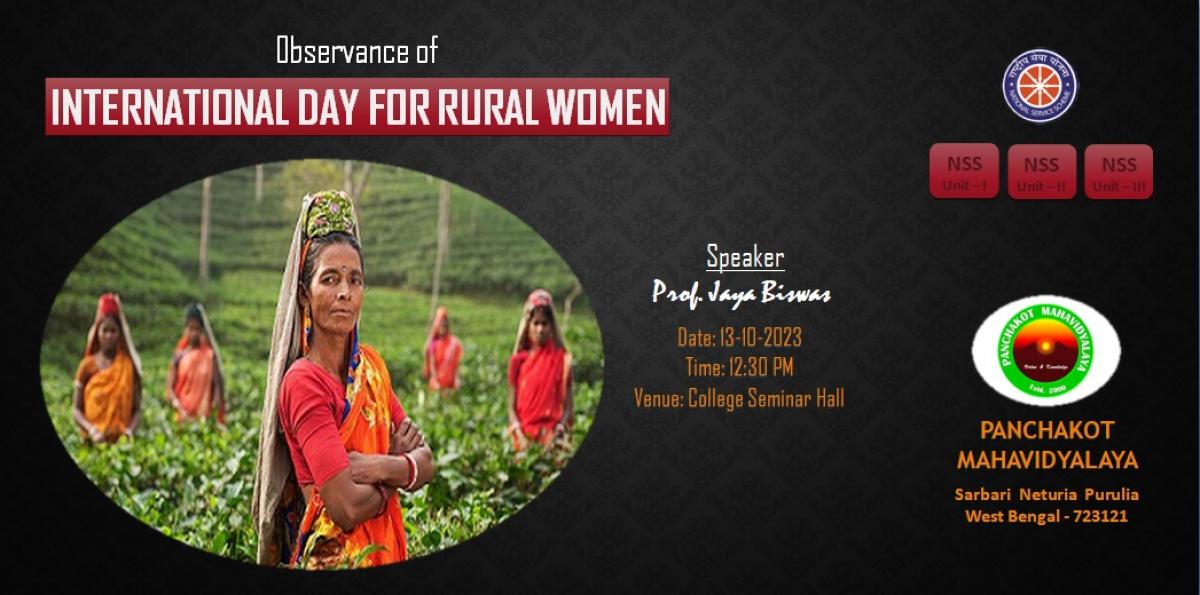
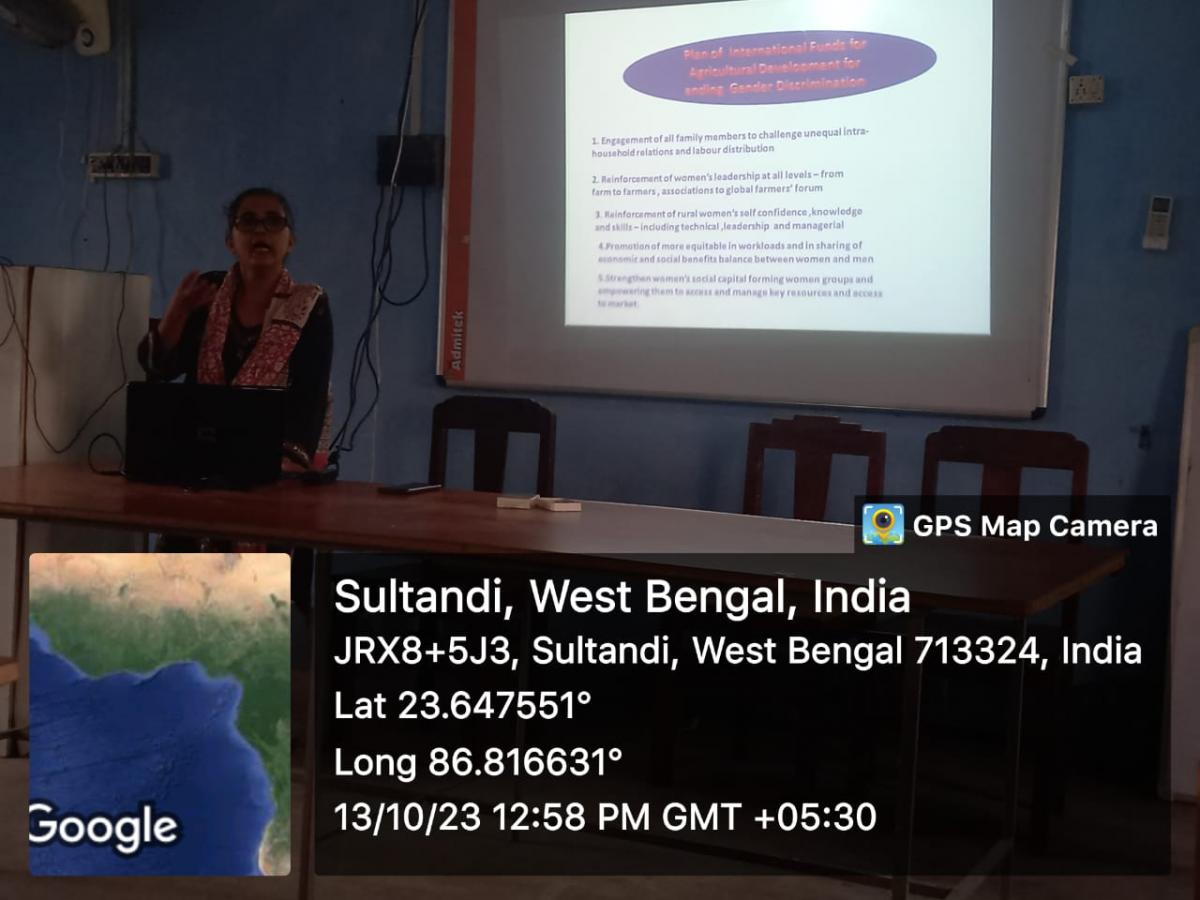
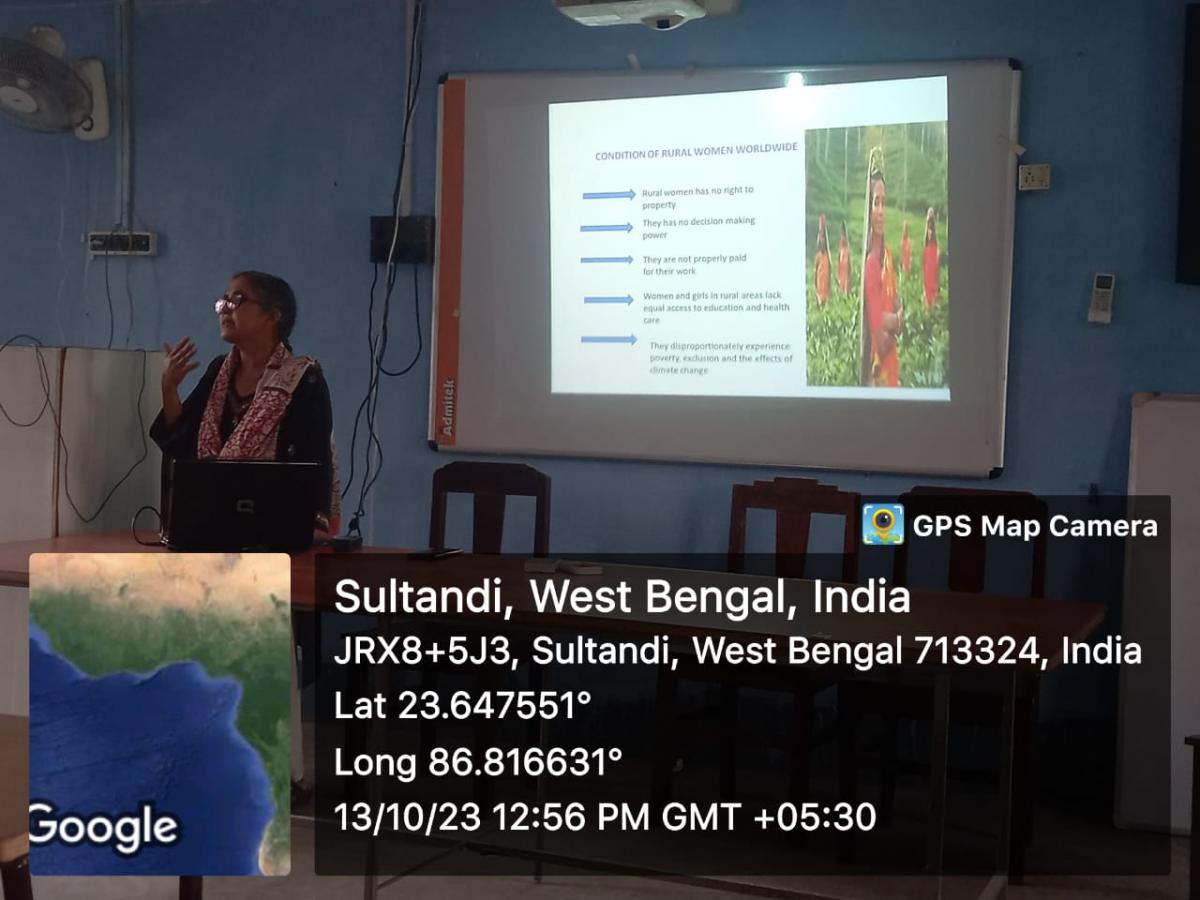
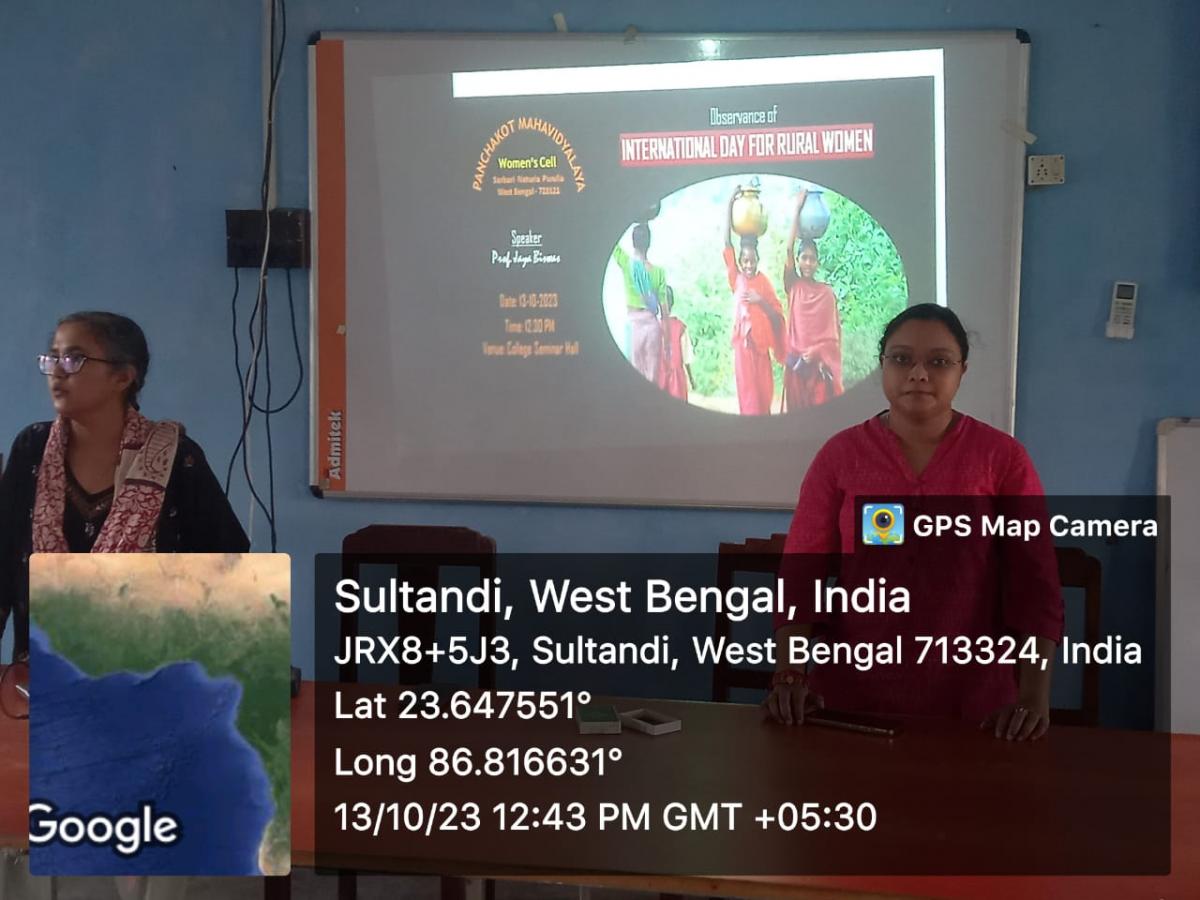
Programme on 28-11-2023
Violence against women and girls remains one of the most prevalent and pervasive human rights violations in the world. Globally, an estimated 736 million women — almost one in three — have been subjected to physical and/or sexual intimate partner violence, non-partner sexual violence, or both, at least once in their life. This scourge has intensified in different settings, including the workplace and online spaces, and has been exacerbated by post-pandemic effects, conflicts, and climate change. The solution lies in robust responses, including investment in prevention. However, alarmingly, data on how much nations are committing to counteract violence against women and girls remains glaringly sparse. NSS has obderved this day and sensitized the local people via a RALLY to create awareness of the different types of violence faced by women, promoting advocacy, and creating better opportunities for women.
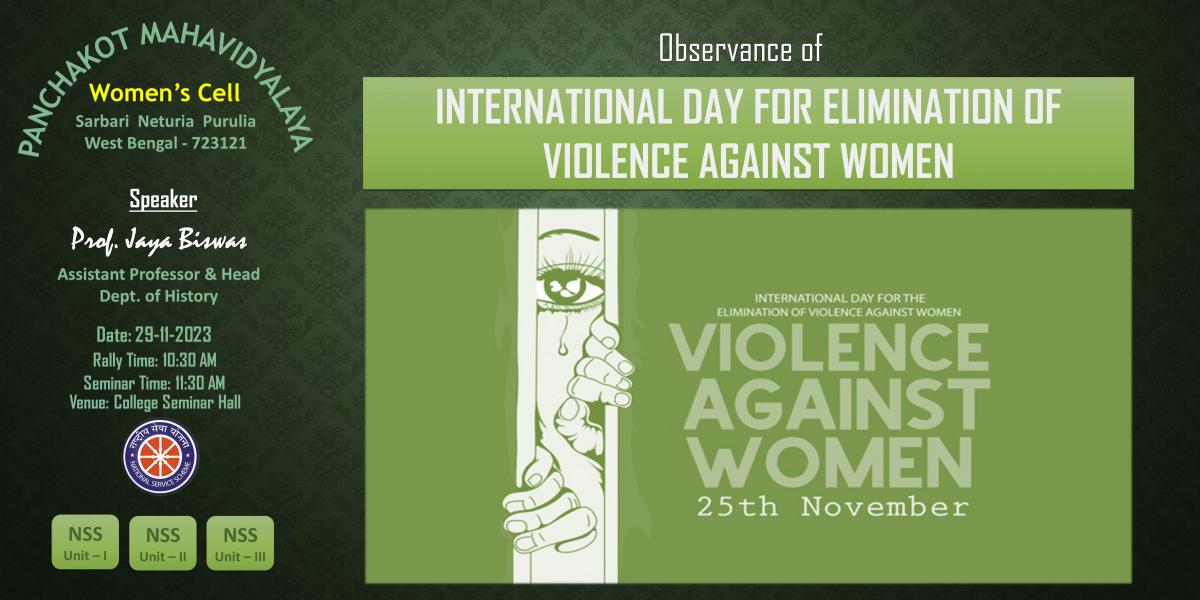
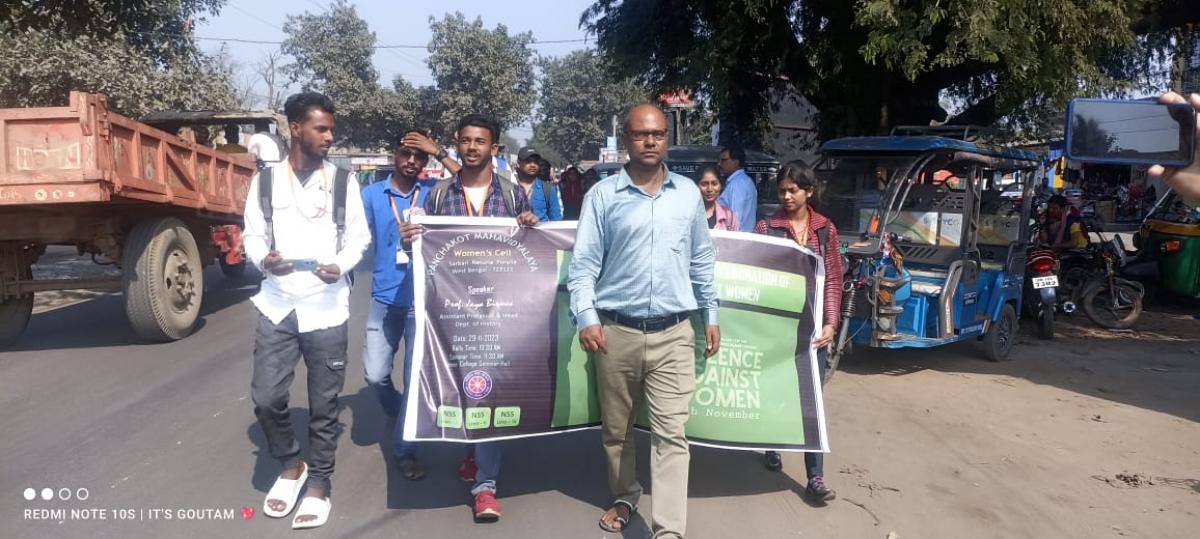
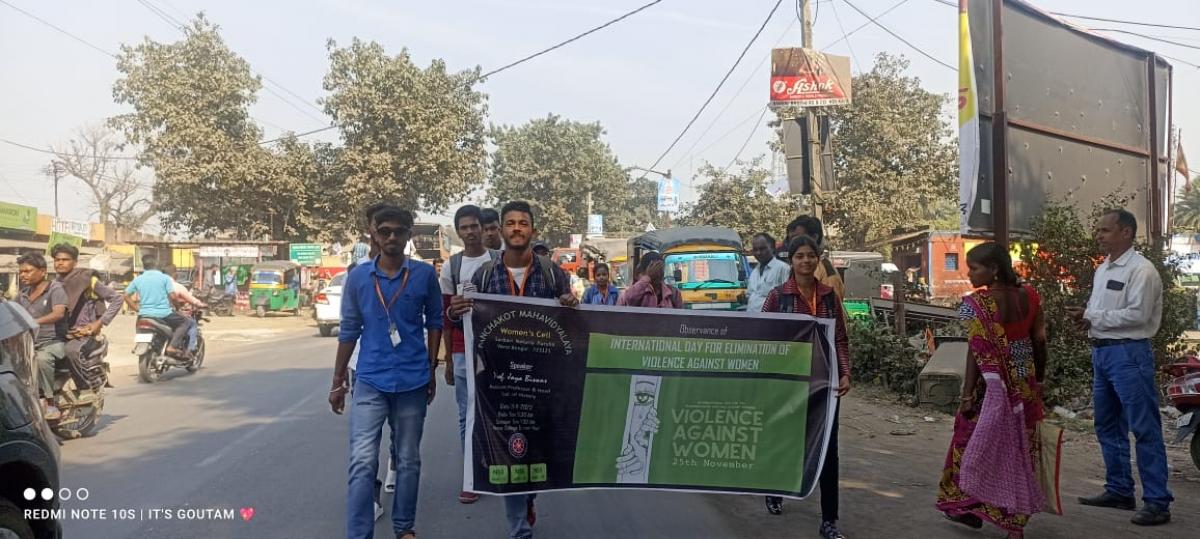
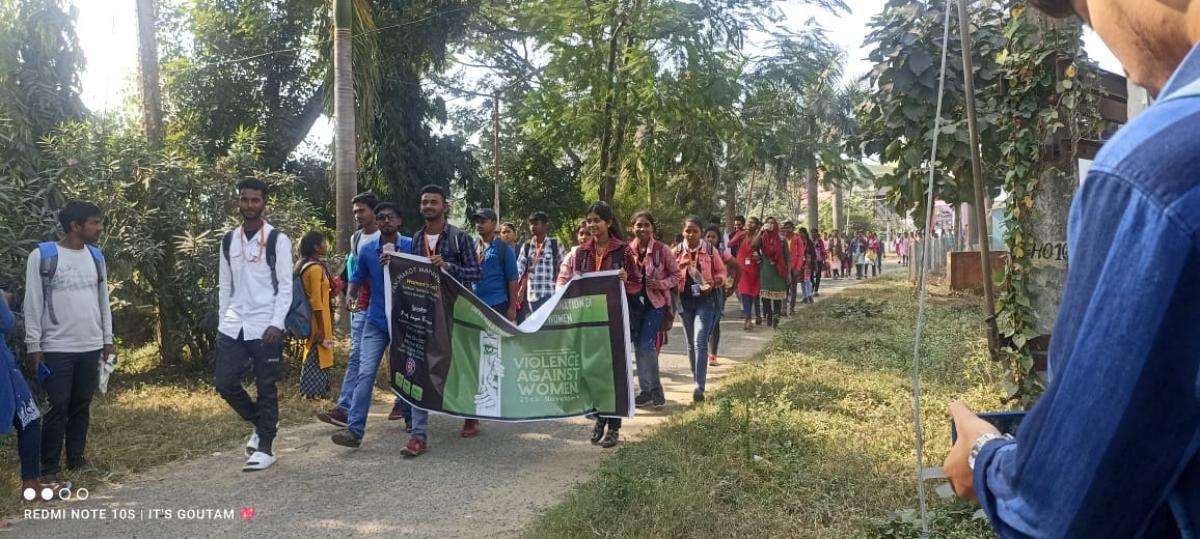
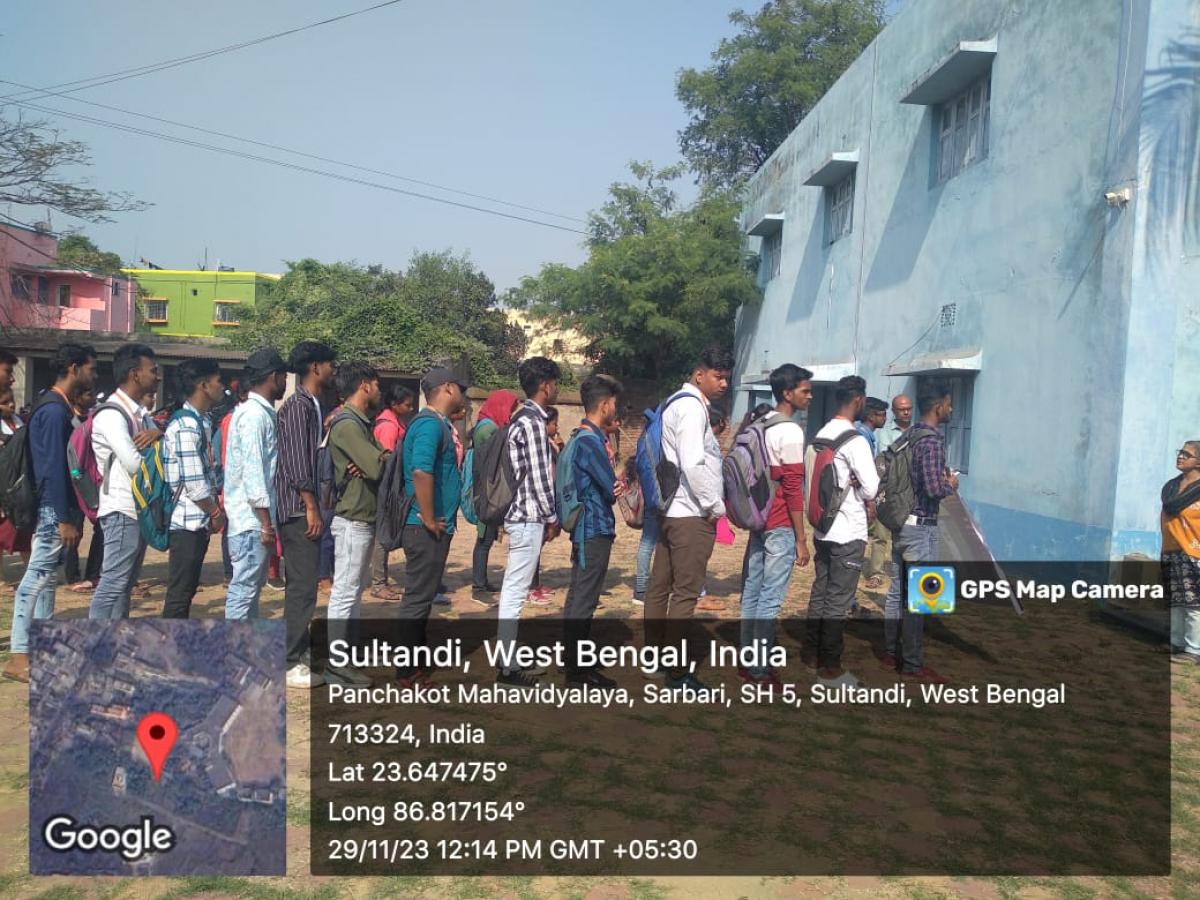
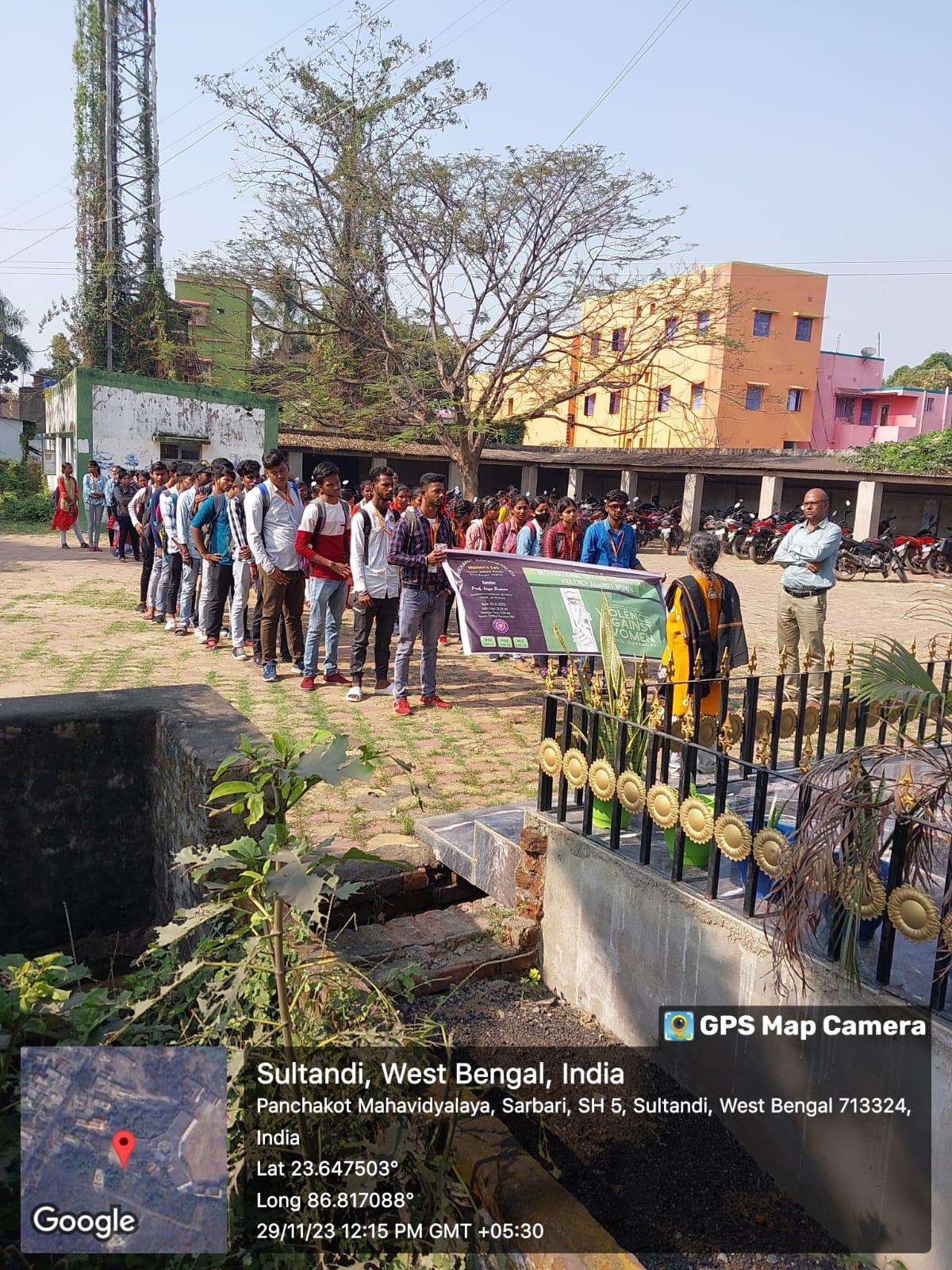
/nnnn
✖
zoom